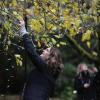March 8, 2007 - 4:00pm
Malaspina University-College Biology graduate Dr. Tanya Griffiths returns to her roots next week to talk about human bacteria.
This bright, articulate 30-year-old post-doctoral research fellow at the University of Calgary (Gastrointestinal Research Group) will be the guest lecturer for Malaspina’s Science and Technology free public lecture series. Her talk, at 7 pm March 14, will focus on “Bacteria in the Human Gut: the Good, the Bad and the Ugly.” Earlier in the day, she will speak to third-year Biology students about her experiences in graduate school and as a post-doctoral researcher.
“Tanya is a perfect example of what someone can achieve with an undergraduate degree from Malaspina University-College,” said Dr. Allan Gibson, one of her former professors. “We’re delighted she’s coming back to share her experiences.”
Speaking from the lab in Calgary where she studies intestinal bacteria in relation to human inflammatory bowel disease, Griffiths said obtaining her undergraduate degree at Malaspina was one of the best decisions she’s ever made.
Griffiths, who grew up in Duncan, had virtually no interest in sciences. “In fact, I hated Biology in high school,” she said. But after graduating from Chemainus Secondary in 1994, she decided to become a nurse. Griffith enrolled in Malaspina’s Adult Basic Education (ABE) program at the Cowichan campus to get the prerequisites she needed.
“I had a wonderful ABE teacher for Biology 11 and 12,” recalled Griffiths. “One day, she looked at me, and said Tanya, you shouldn’t be the nurse. You should be the doctor. You’ll be doing yourself a disservice if you don’t get a Biology degree.”
That kind of positive encouragement motivated Griffiths to enrol in first-year sciences at Malaspina's Nanaimo campus. Four years later, she was co-winner of the Biology Department’s Outstanding Student Award, and was accepted straight into the Ph.D. program at the University of British Columbia (UBC), with a full fellowship to fund her graduate studies.
“It’s rare for an undergraduate student to skip the Master’s degree and go directly into a doctoral program,” said her UBC Ph.D. supervisor, professor Dr. Ross MacGillivray. “Fellowships are highly competitive scholarships, with about 60 students a year applying for only three or four spots each year. Tanya competed against national and international students. She rose to the top.”
Griffiths was accepted because of her superb academic record, her research experience at Malaspina, and outstanding recommendations from Malaspina faculty. Her success is a clear indication that Malaspina’s independent degree program is highly respected and equivalent to big city universities, added MacGillivray, a UBC professor for over 25 years. “In my view, students who transfer to UBC after two years or four years of study at Malaspina are highly competitive,” he said.
While working with Dr. MacGillivray in the Department of Biochemistry and Molecular Biology, Griffiths’ dissertation research involved the study of iron absorption by the small intestine. She graduated with a Ph.D. in January 2006, and remained in Vancouver working for Dr. MacGillivray until she moved tothe University of Calgary in September.
Highlights at UBC included teaching Dr. MacGillivray’s Biochemistry 300 course to approximately 200 students for two weeks, giving a short speech at the opening of the Life Sciences Centre, having lunch at (then) President Martha Piper’s residence, and meeting with Canadian Institutes of Health Research president Alan Bernstein to act as a spokesperson for graduate students in the Centre for Blood Research.
But it was her undergraduate experience at Malaspina that gave Griffiths the confidence and skills needed to succeed at UBC and beyond, she said.
“All undergraduate Biology students at Malaspina conduct a year-long directed research project (Biology 491) and present their scientific findings in a public setting at the end of the school year,” said Griffiths. “These public presentations of scientific data and knowledge set me on the proper footing and gave me confidence for my future academic and work career. Not only did I gain a strong theoretical background in my field, but due to both upper-level courses and from working in the labs at Malaspina, I gained valuable hands-on experience. As an undergraduate at a larger institution, I wouldn’t have had the same opportunity.”
At Malaspina, Griffith carried out research on a cancer-causing gene under the supervision of Dr. Allan Gibson, and worked in a lab for a year as a student assistant with Rob Wager, molecular biology lab demonstrator.
“Dr. Gibson gave me a lot of freedom to design my own experiments and come up with all the proper negative and positive experimental controls during my undergrad research project (Biology 491),” she said. “These skills are vital when in a laboratory-based graduate program.”
Initially, Griffiths planned to transfer to the University of Victoria after two years at Malaspina. “But I realized just how much I was learning. We were conducting cutting-edge research. There was no point leaving such a great school.”
-30-
Editor’s note:
People suffering from Crohn’s disease won’t want to miss Dr. Tanya Griffiths’ free public lecture, 7 pm March 14 at Malapsina University-College’s Student Services Building 200, Room 203. In her lecture, Griffiths will address Bacteria in the human gut: the Good, the Bad and the Ugly.
“There are more bacterial cells than human cells in our bodies, and our intestines house the majority of these bacteria,” said Griffiths, a post-doctoral research fellow at the University of Calgary and Malaspina Biology alumnus.
“Our laboratory studies intestinal bacteria in relation to human inflammatory bowel disease (such as Crohn’s disease). During my presentation I will introduce the audience to friendly gut bacteria, as well as describe their role in maintaining our health and introduce them to some gut pathogens.”
Griffiths’ lecture is sponsored by the Mid-Island Science, Technology and Innovations Council (MISTIC), Natural Sciences and Engineering Research Council (NSERC), Innovation and Development Corporation (IDC), MFA Professional Development Committee. For more information, visit web.viu.ca/simmsw/.
Tags: In the Community






